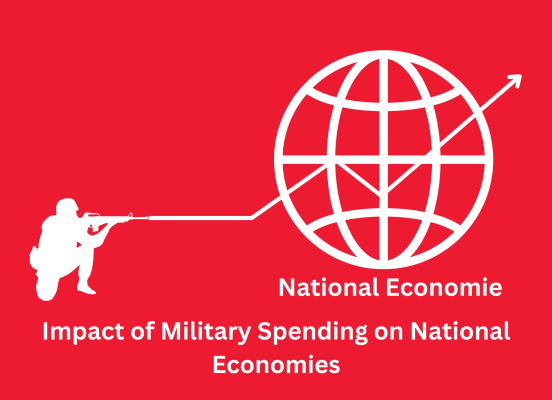
Impact of Military Spending on National Economies: Examining the Economic Effects of Allocating Resources to Defense
- By admin --
- Saturday, 09 Mar, 2024
Introduction:
Military spending, a significant component of government budgets, has both direct and indirect effects on national economies. While defense expenditures are intended to ensure national security and deter potential threats, their economic implications extend beyond the defense sector. This essay explores the multifaceted impact of military spending on national economies, encompassing areas such as employment, innovation, resource allocation, and fiscal policy.
Employment and Economic Stimulus:
One of the primary effects of military spending on national economies is its role in job creation and economic stimulus. Defense expenditures generate employment opportunities across various sectors, including manufacturing, technology, logistics, and services. Defense contracts and procurement projects provide steady employment for millions of workers, ranging from engineers and scientists to construction workers and administrative staff. Additionally, military bases and installations serve as economic engines in local communities, supporting small businesses and infrastructure development.
However, it's essential to recognize that military spending may not always lead to optimal allocation of resources in terms of job creation. Investments in defense often come at the expense of other sectors such as education, healthcare, and infrastructure, which could potentially generate more sustainable and productive employment opportunities. Moreover, the defense industry's reliance on government contracts and subsidies may distort market mechanisms and hinder the development of innovative and competitive industries.
Innovation and Technological Advancement:
Military spending plays a crucial role in driving technological innovation and advancement, with defense research and development (R&D) often leading to spin-off technologies and commercial applications. Investments in defense-related technologies have contributed to breakthroughs in areas such as aerospace, telecommunications, computing, and materials science. Technologies originally developed for military purposes, such as GPS, the internet, and satellite imaging, have found widespread civilian applications, fueling economic growth and competitiveness.
Furthermore, the defense sector serves as a catalyst for high-skilled research and innovation, attracting talent and investment in science and engineering fields. Government-funded defense R&D programs often partner with universities, research institutions, and private companies, fostering collaboration and knowledge transfer. However, critics argue that the focus on military-related technologies may divert resources away from addressing pressing societal challenges such as climate change, healthcare, and poverty alleviation.
Resource Allocation and Opportunity Cost:
The allocation of resources to defense spending involves trade-offs and opportunity costs for national economies. Governments must weigh the benefits of military preparedness and security against competing priorities such as social welfare, infrastructure, and environmental protection. High levels of military spending can strain public finances, leading to budget deficits, inflationary pressures, and crowding out of productive investments.
Moreover, excessive reliance on military solutions to address security challenges may undermine diplomatic efforts, conflict resolution, and international cooperation. Redirecting resources from defense to diplomacy, development aid, and conflict prevention initiatives could potentially yield greater long-term benefits in terms of global stability and peacebuilding. Additionally, investments in non-military sectors such as education, healthcare, and infrastructure are essential for building resilient and inclusive economies capable of addressing underlying drivers of insecurity and instability.
Fiscal Policy and Economic Stability:
Military spending influences fiscal policy and macroeconomic stability, particularly in countries with large defense budgets. Defense expenditures represent a significant portion of government outlays, affecting taxation, public debt, and overall economic performance. High levels of military spending may necessitate higher taxes or borrowing, diverting resources away from private consumption, investment, and economic growth.
Furthermore, defense-related industries and contractors may exert political influence, lobbying for increased military budgets and government support. The defense-industrial complex, characterized by close ties between the military establishment, defense contractors, and policymakers, can shape procurement decisions and defense policy priorities. Critics argue that this can lead to wasteful spending, cost overruns, and inefficiencies in defense procurement, undermining economic efficiency and accountability.
Conclusion:
Military spending affects countries' economies in different ways as it varies from one region to another making it have multiple sides. Defense budgets boost economic growth by making technological advancement possible and generating new employments. However, whatever is used for defense may be required elsewhere hindering its development thereby leading to poor resource allocation and other adverse effects.





